top of page



Picnic by William Inge
Some History:
Picnic began as a short, fragmented play called Front Porch, which Inge wrote in 1947 and is unpublished. Front Porch focused on the women who would become the older generation (the "spinsters") in Picnic , exploring their longings, regrets, loneliness, and the lives they wish they'd lead. Front Porch premiered in St. Louis, MO, where Inge briefly lived, for a short run with small audiences. Inge's next play, another one-act called Man in Boots, told what would be Hal's story, and the two plays caught the attention of Broadway director Joshua Logan.
Logan urged Inge to combine the two plays, pushing him to give the young lovers a happy ending. Inge resisted, but Logan argued that audiences would revolt if the two lovers didn't unite in the end. Inge tried several endings, all of which Logan rejected. Then he landed on the deceptively happy conclusion in which Madge decides to go after Hal, disregarding her mother's desperate and knowing advice. This ending satisfied Logan, although older and wiser audience members might recognize Madge's fate as she follows in her mother's inauspicious footsteps.
Picnic premiered on Broadway in 1953, and it was an enormous success, running for 477 performances, winning the 1953 Pulitzer Prize for Drama, and becoming a fixture in the American theatre canon. Years later, Inge reworked Picnic again into a play called Summer Brave, of which he wrote:
"I have written before that I never completely fulfilled my original intentions in writing Picnic before we went into production in 1953, and that I wrote what some considered a fortuitous ending in order to have a finished play to go into rehearsal. A couple of years after Picnic had closed on Broadway, after the film had made its success, I got the early version out of my files and began to rework it, just for my own satisfaction. Summer Brave is the result. I admit that I prefer it to the version of the play that was produced, but I don't necessarily expect others to agree. Summer Brave might not have enjoyed any success on Broadway whatever, nor won any of the prizes that were bestowed upon Picnic. But I feel that it is more humorously true than Picnic, and it does fulfill my original intentions."
Summer Brave had a brief run on Broadway in 1975, two years after Inge's death in 1973. It is published by Dramatists Play Service and in some Inge anthologies.
If you are interested in reading Summer Brave, you can access a PDF by clicking here.

About The Playwright
William Inge (1913-1973) was one of the
most celebrate American playwrights of the 1950s. He was born in the small town of Independence, Kansas. Since his father, as a traveling salesman, was frequently away for work, Inge was primarily raised by his mother with his two older sisters. A third sister died at the age of three, and an older
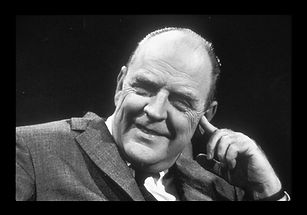

brother died when Inge was a teenager. The influence of his upbringing by a strong, authoritative woman is reflected warmly in his work, particularly through Flo and the other older women in Picnic. His depiction of Rosemary and the other unmarried schoolteachers is based on the three teachers who lived with the Inges in his mother's boarding house when he was four. Inge explained, "I liked them. I saw their attempts and, even as a child, I sensed every woman's failure. I began to sense the sorrow and the emptiness in their lives and it touched me." Bits of
Inge and his siblings
Inge's autobiography continued to show up as a significant influence
in his work throughout his life.

Inge, who saw his father's serial philandering and listened to his mother oversharing about her own sex life, developed a difficult relationship with his own sexuality. This was complicated by his growing growing awareness that he was gay, which he never acknowledged
publicly. These issues were amplified by trauma from his first sexual experience during his first year of college at the University of Kansas, when Inge felt obligated to participate in a fraternity orgy to prove his masculinity. He also began to struggle with depression and
Inge playing dress-up at age ten
alcoholism. Inge earned his bachelor's degree in Speech and Drama, with plans to become a professional actor. But Inge decided not to pursue acting, instead accepting a scholarship to earn his master's at a teaching college. But he dropped out of grad school, finding himself suddenly rudderless. From 1937-38, Inge taught high school English and Drama in Columbus, KS, then returning to finish his master's degree. After several years of teaching at Stephens College in Columbia, MO, he moved to St. Louis and accepted a job as a drama critic.
As a critic, Inge met Tennessee Williams and joined the playwright for a performance of The Glass Menagerie in Chicago. Inspired, Inge decided that he needed to write a play. Within three months, a short play that Inge had written was premiering in Dallas. He took a teaching job at Washington University and, on the advice of his therapist, joined Alcoholics Anonymous. Inge's first major play, Come Back, Little Sheba, premiered on Broadway in 1950, marking Inge as a significant up-and-coming talent. Picnic, which opened on Broadway

in 1953, was lauded by critics and showered with awards. His 1955 play Bus Stop was also lauded and adapted into a 1956 film vehicle for Marilyn Monroe. A thriller, The Dark at the Top of the Stairs, was also celebrated when it premiered in 1957. After these successes, Inge was plagued by a series of flops along with his mother's death, and his health plummeted. Finding the criticism of his work too upsetting, Inge left New York. He briefly tried teaching again, until his mental health issues became overwhelming, and wrote he two novels.
In 1973, he narrowly survived an alcohol and valium overdose, but shortly after returning home from the hospital, Inge died by suicide in his garage.

Production History
Broadway Premiere - Music Box Theatre
February 19th, 1953 - April 10, 1954
Run: 477 performances
Opening Night Cast:
Helen Potts, a neighbor............................................................................ Ruth McDevitt
Hal Carter, a young vagabond................................................................. Ralph Meeker
Millie Owens, a 16-year-old girl............................................................. Kim Stanley
Bomber, the paper boy................................................................................. Morris Miller
Madge Owens, a beautiful girl.................................................................. Janice Rule
Flo Owens, mother of the girls........................................................... Peggy Conklin
Rosemary Sydney, a schoolteacher.................................................... Eileen Heckert
Alan Seymour, boyfriend of Madge....................................................... Paul Newman
Irma Kronkite, a schoolteacher.................................................................... Reta Shaw
Christine Schoenwalder, a schoolteacher............................... Elizabeth Wilson
Howard Bevans, Rosemary's date.................................................... Arthur O'Connell
*This was Paul Newman's Broadway debut.










Watch the 1953 Broadway Cast perform on The Ed Sullivan Show:
*Scenic Design by Jo Mielziner, who was the most prominent and innovative designer on Broadway for about forty years.
Awards:
1953 - New York Drama Critics' Circle - Best American Play
1953 - Pulitzer Prize for Drama
1953 - Theatre World Award - Paul Newman
1953 - Theatre World Award - Eileen Heckart
1954 - Tony Award - Stage Technician - John Davis
1954 - Tony Award - Directing - Joshua Logan

Production History
Broadway Revival - Roundabout Theatre Co.
April 21, 1994 - May 28, 1994
Run: 26 previews, 45 performances
Opening Night Cast:
Helen Potts, a neighbor........................................................................... Anne Pitoniak
Hal Carter, a young vagabond............................................................... Kyle Chandler
Millie Owens, a 16-year-old girl................................................... Angela Goethals
Beano, the paper boy.............................................................................. W. Aaron Harpold
Madge Owens, a beautiful girl.................................................................. Ashley Judd
Flo Owens, mother of the girls.......................................................... Polly Holliday
Rosemary Sydney, a schoolteacher............................................................. Debra Monk
Alan Seymour, boyfriend of Madge...................................................... Tate Donovan
Irma Kronkite, a schoolteacher.......................................................... Audrie Neenan
Christine Schoenwalder, a schoolteacher................................. Charlotte Maier
Howard Bevans, Rosemary's date....................................................... Larry Bryggman

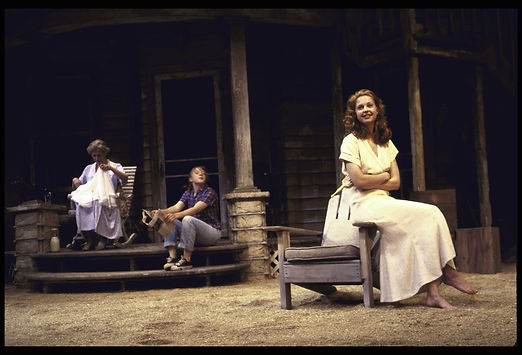







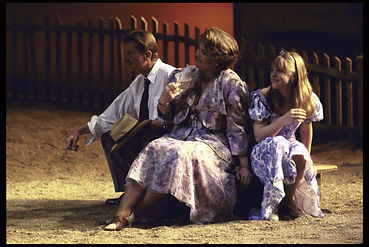






Production History
Broadway Revival - Roundabout Theatre Co.
January 13, 2013 - February 24, 2013
Run: 36 previews, 49 performances
Opening Night Cast:
Helen Potts, a neighbor............................................................................. Ellen Burstyn
Hal Carter, a young vagabond.............................................................. Sebastian Stan
Millie Owens, a 16-year-old girl................................................ Madeleine Martin
Bomber, the paper boy................................................................................ Chris Perfetti
Madge Owens, a beautiful girl............................................................... Maggie Grace
Flo Owens, mother of the girls.................................................... Mare Winningham
Rosemary Sydney, a schoolteacher............................................... Elizabeth Marvel
Alan Seymour, boyfriend of Madge................................................... Ben Rappaport
Irma Kronkite, a schoolteacher......................................................... Maddie Corman
Christine Schoenwalder, a schoolteacher............................................ Cassie Beck
Howard Bevans, Rosemary's date................................................................ Reed Birney
Mrs. Potts's Mother.................................................................................... Lizbeth MacKay





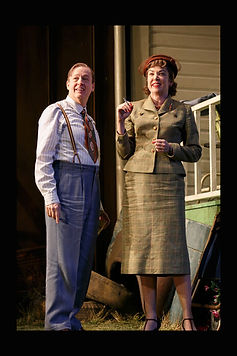




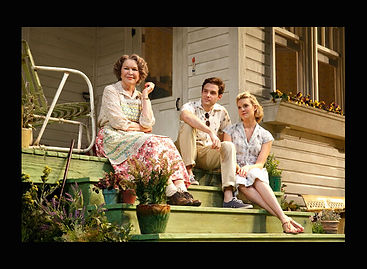


About the Production:
Watch Clips from the 2013 Revival:

Adaptations
Picnic saw many different adaptations, including a short-lived musical called Hot September (1965), two television films (1986 and 2000), and two operas (2008 and 2009). But the most famous adaptation is the film that was made shortly after Picnic premiered on Broadway:
Picnic (1955)
Film by Columbia Pictures
Directed by Joshua Logan
Starring: William Holden (Hal), Kim Novak (Madge), Betty Field (Flo), Susan Strasberg (Millie), Cliff Robertson (Alan), Arthur O'Connell (Howard), Verna Felton (Mrs. Potts), and Rosalind Russell (Rosemary)
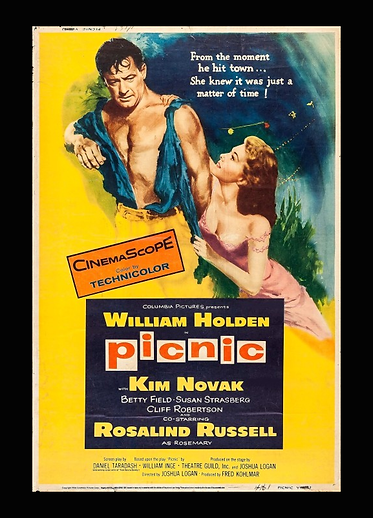









bottom of page
